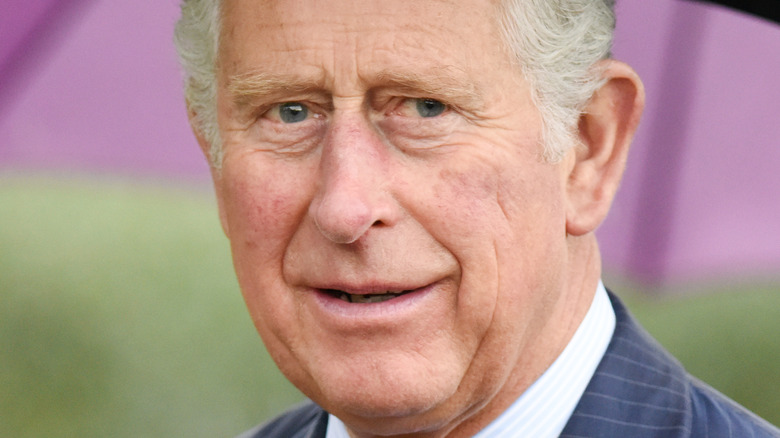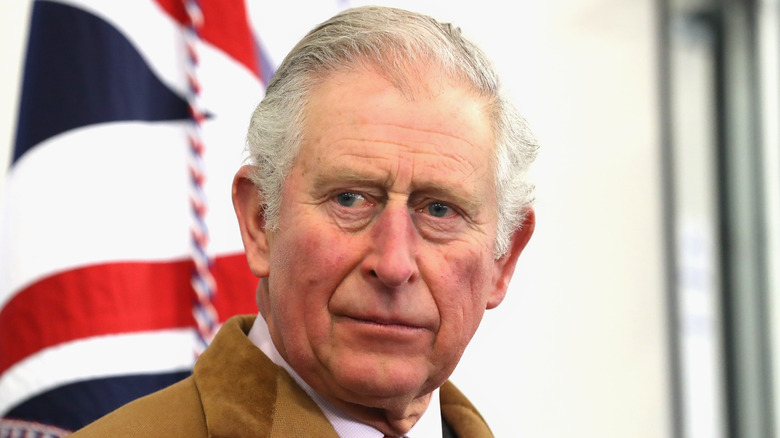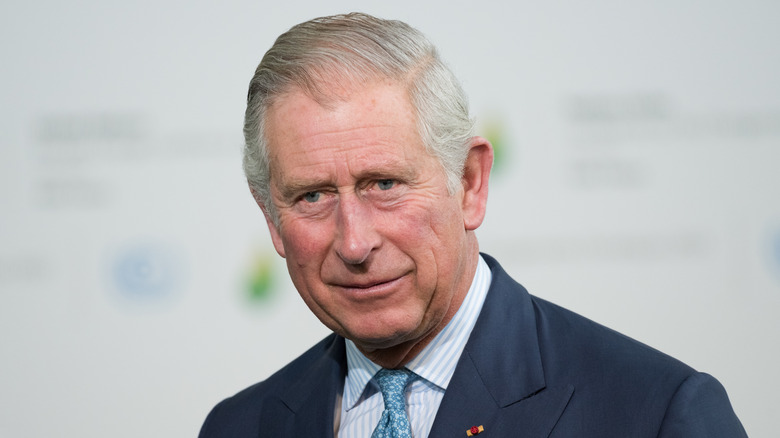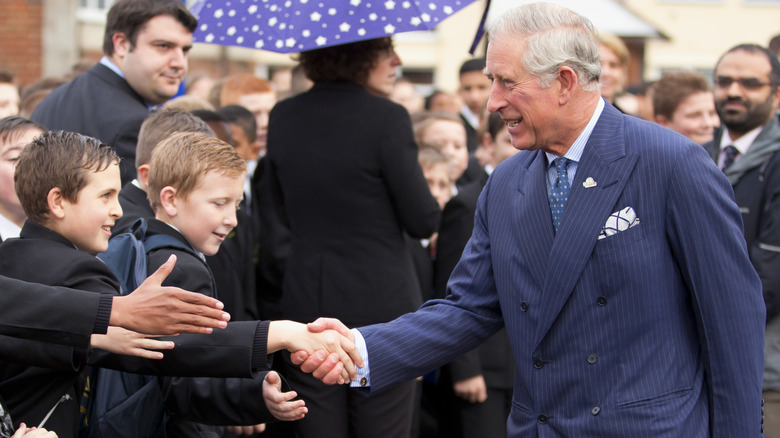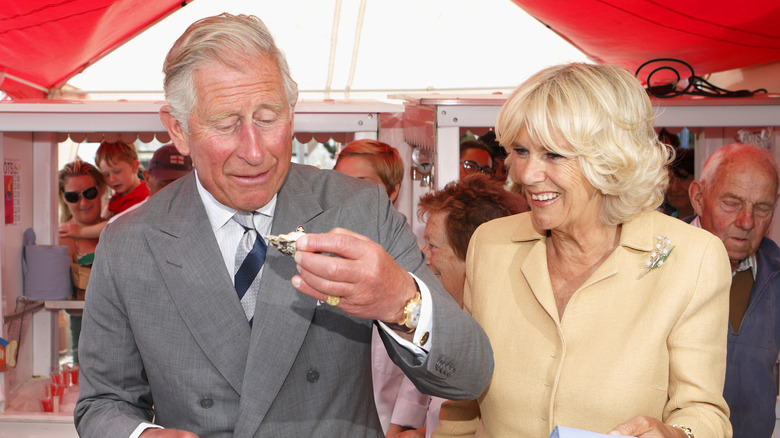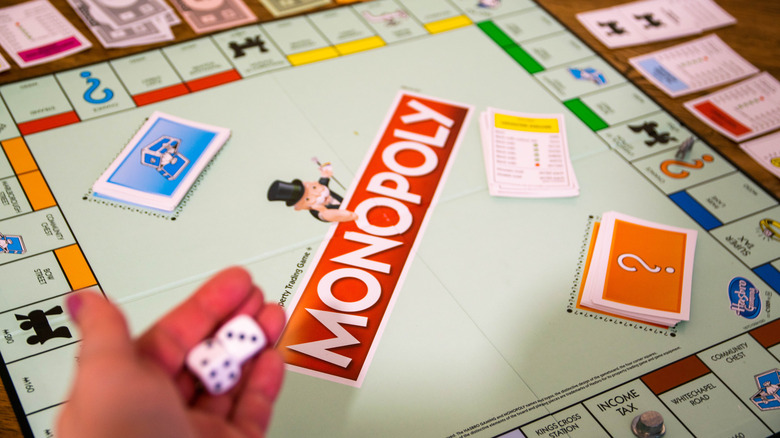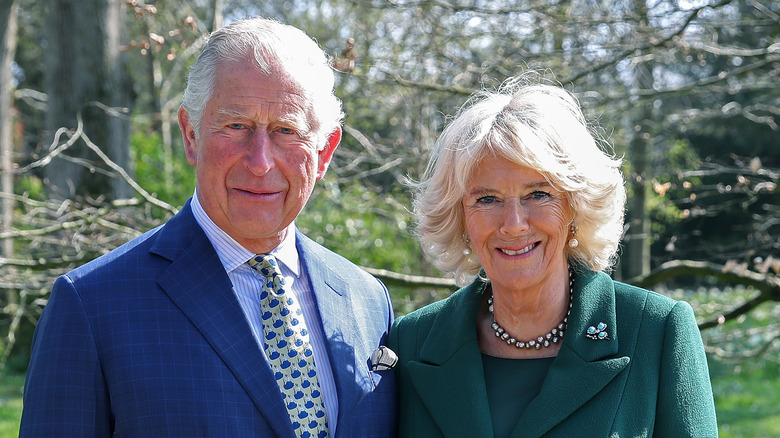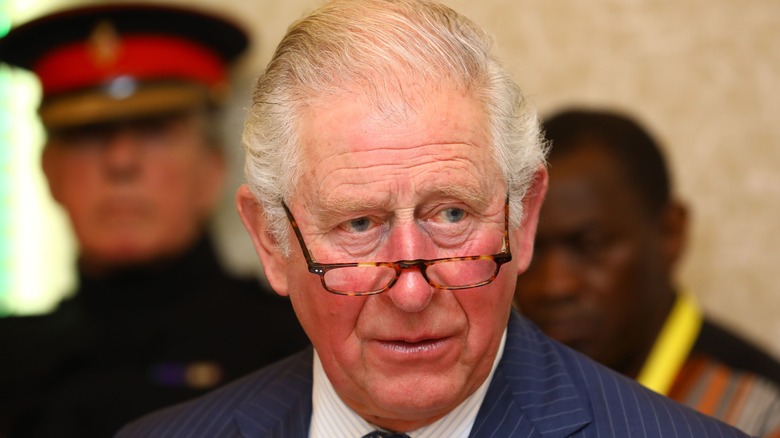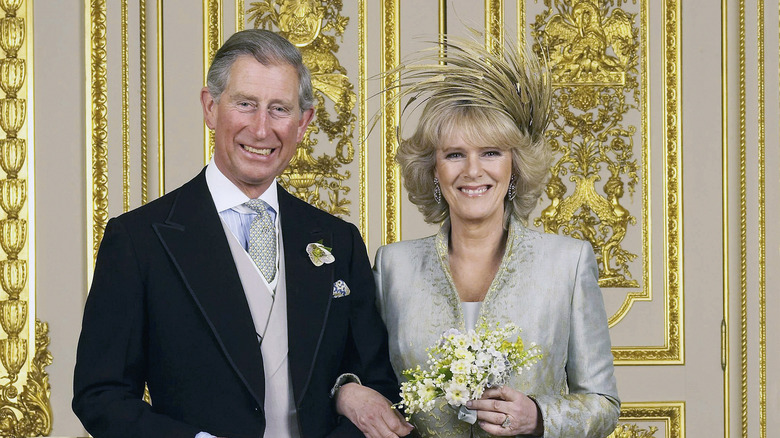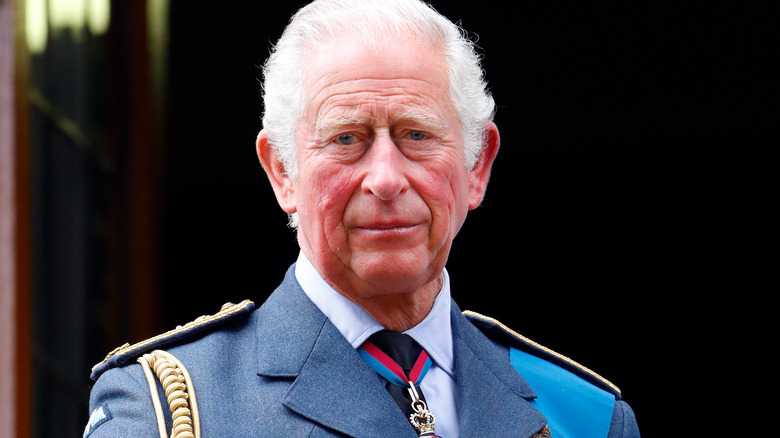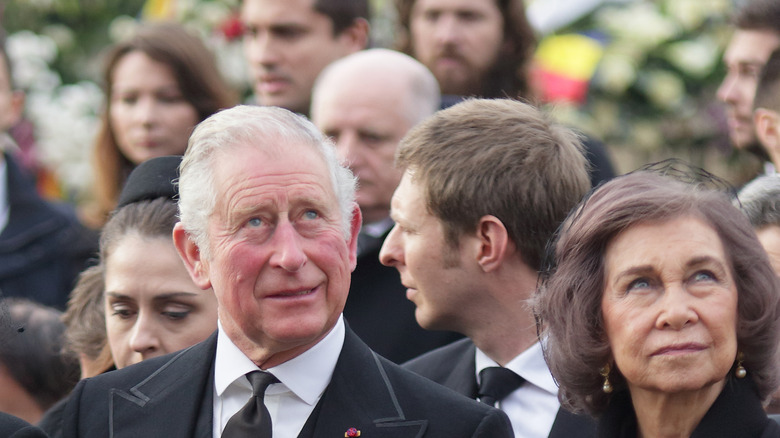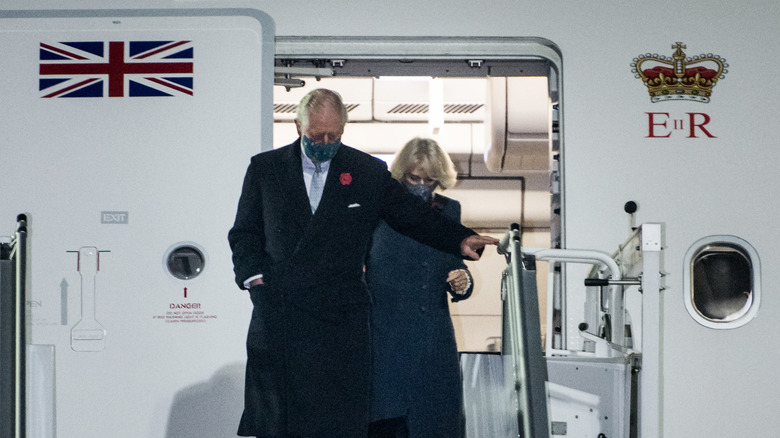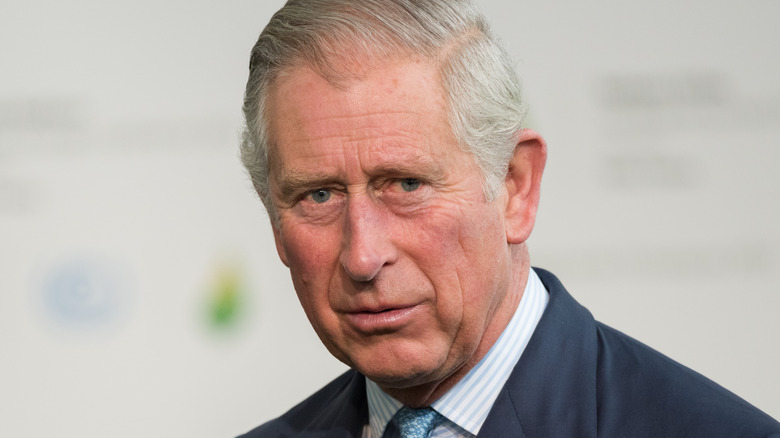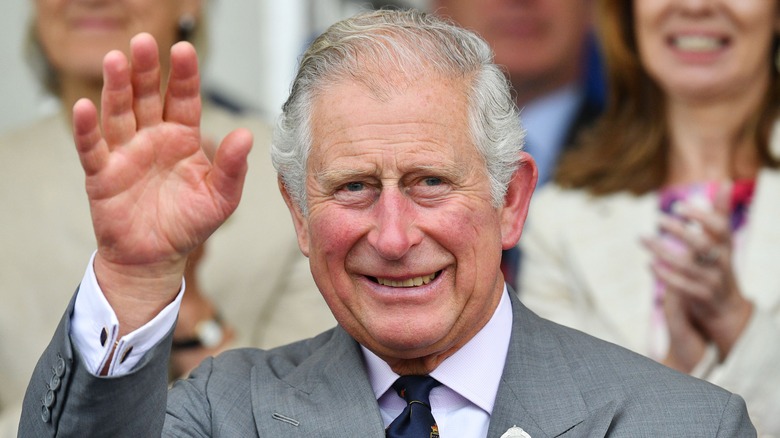Things Prince Charles Has Never Been Allowed To Do
As heir to the British throne, Prince Charles is one of the most senior members of the royal family and, as such, is required to follow protocols. Most of these are not laws or even written rules but, rather, conventions that the royals have established over time and are expected to follow (via Hello!). Charles does not face a ton of rules specifically, but he and other senior members of the royal family — including his sons, Prince William and Prince Harry — are subject to traditions or protocols regarding their behavior. Many of these rules were implemented by Queen Elizabeth II in her 70 years as ruler due to her own experiences.
From time to time, however, these rules are stretched or broken by Charles or other members of his family. While there is no real punishment in place, breaches of protocol are frowned upon by the queen and often discussed in the press. When Charles becomes king one day after his mother's death, it will be up to him to establish his own protocols for leading the next chapter of royal life.
Prince Charles has never voted
Unlike other political leaders and heads of state, members of the British royal family are never snapped putting their papers in ballot boxes on election day, and there is a very simple reason for this — they don't vote. According to the official website for the royal family, Queen Elizabeth II does not vote or stand for election. There is no official law against this; instead, it's seen as more of a "convention."
It's interesting to note that this rule is also encouraged for other senior members of the royal family. A Buckingham Palace spokesperson told Newsweek that those "close to the queen" do not vote. And, although the spokesperson did not specify exactly whom this would cover, it was said to particularly apply to "senior members" of the royal family. This would include Prince Charles and his sons, Prince William and Prince Harry. Although their wives may have voted before they married into the royal family, the convention would discourage them from doing so moving forward.
Prince Charles has pushed the boundaries when it comes to politics
The convention for the royal family not to vote comes from the idea that they should not be involved in politics at all. Queen Elizabeth II must "remain strictly neutral with respect to political matters" (per the official royal website), and the convention is expected to apply to other senior royals, including Prince Charles (per the Express). However, Charles has been criticized in the past for the way in which he has supported certain causes and has even been deemed "too political."
While he has never shown support for a political party, Jenny Hocking, historian and member of the National Committee of the Australian Republic Movement, told the Express that Charles has publicly spoken out on matters regarding architecture, the environment, and fox hunting. The Guardian also spent a decade fighting for the release of the "black spider letters," which show evidence of Charles writing to members of the government on matters ranging from the Iraq war to alternative therapies. Speaking to the BBC in 2018, Charles said that, while he has always tried to be "non-party political," he recognizes that, when he becomes king, his involvement in activism will have to change.
Signing autographs or taking selfies with the public is not allowed
Getting out and meeting the public on walkabouts are a big part of royal life, but royal protocol bans signing autographs. Prince Charles has been known to say "I'm sorry, they don't allow me to do that" if asked to sign something by a member of the public, and it's thought to be for security reasons, per Insider. He did break the rules in 2010, though, when he signed a piece of paper for a family who had been affected by flooding. However, photographer Paul Williams told the Daily Mail it was an incredibly rare occurrence. While the royal family may occasionally sign guest books and, of course, official documents, an autograph is described as something that "never" happens. Charles is not known to have given any autographs since.
And, in modern times, signatures are not the only problem for the royals — everyone wants a selfie for social media. But CNN Royal Commentator Victoria Arbiter told Insider that snapping a pic with the public isn't usually allowed, as it sets a precedent to give one to everyone, and, security-wise, it involves the royals getting too close to strangers. Arbiter did add that the royals may be allowed to do so in certain circumstances, such as when visiting a sick child in the hospital.
Seafood and garlic aren't usually on the menu
While not a strict rule, there is a convention, established by Queen Elizabeth II, that the royal family, including Prince Charles and Camilla, Duchess of Cornwall, should not eat seafood while on duty. Former royal butler Grant Harold told Woman & Home that this is to avoid "a serious reaction to food poisoning." Garlic is another no-go. Former royal chef Darren McGrady said he was not allowed to cook with the spice at Buckingham Palace because the queen doesn't like garlic (via the Daily Mail). Although Charles has been spotted breaking the rules, such as the time he enjoyed oysters in 2013 at the Whitstable Oyster Festival with wife Camilla (via Hello!), he's unlikely to ever be able to enjoy seafood or garlic with his mother present.
There are also some foods Charles has banned in his own household. In 2008, he told his chefs not to cook with foie gras due to animal welfare concerns, though it's not clear if it was on the menu before that point (via Woman & Home).
Prince Charles can't play Monopoly with his siblings
While board games might be a feature of many family occasions, for the royals, there is one that Queen Elizabeth II does not allow her children, Prince Charles, Princess Anne, Prince Andrew, and Prince Edward, or their families to play: Monopoly (via The Telegraph). It's not due to any real ceremonial reason, but simply because of the competitive personalities clashing when the property-themed game comes out. Her Majesty apparently does not wish to have to adjudicate when someone lands on the most expensive square and ends up bankrupt.
During an event at the Leeds Building Society's headquarters to mark the building's renovation in 2008, Andrew was presented with a copy of the famous game, but he told reporters that he didn't get to play it at home because it "gets too vicious," per The Telegraph. While he didn't elaborate on what they play during their annual Christmas gathering at Sandringham or when the ban began, it seems that Charles now has to stick to Scrabble.
The royal family frowns upon public displays of affection
Prince Charles is often seen with his wife, Camilla, Duchess of Cornwall, but the pair avoids being too lovey-dovey in public, as royal protocol is to keep any public displays of affection to a minimum. Royal etiquette expert Myka Meier, founder and director of Beaumont Etiquette, told People that, while senior royals are unlikely to be told exactly how to act around their partner, they would be expected to use their "judgement as to when it's appropriate."
While Charles and Camilla have been snapped holding hands (via PureWow), Meier told People they would "adjust PDA to mirror the formality of the event they are attending." They are also expected to behave more formally when on duty, but there have been examples of some royals being a little more affectionate during their own private time. Charles' niece, Zara Tindall, for example, was photographed with her hand on her husband's butt while enjoying the Festival of British Eventing in 2018 (via People).
Prince Charles gets to avoid jury duty
In the U.K., members of the public can be chosen at random and called upon to serve on a jury for a criminal trial at any time. Normally, skipping jury duty comes with a fine of up to £1,000 (equivalent to $1,300), via the Daily Mail, but Prince Charles is currently exempt from ever being called. Until 2003, no one in the royal family or even those who worked for the royal household were required to serve on a jury in the U.K. Other professionals, including doctors, vets, and judges, were also able to be excused from jury duty.
However, the law changed in a bid to ensure more jurors were available for courts (via The Guardian), but Queen Elizabeth II and her immediate family remain exempt. The law does not clarify exactly which members of the immediate royal family would be exempt, but, as heir to the throne, Charles is likely to be included.
Prince Charles can't marry without his mother's permission
The Royal Marriages Act of 1772 gives the monarch the final say on anyone getting married within the family. The act came about because King George III wasn't keen on his own brother's match with Lady Anne Horton, describing her as a "commoner" (via Hello!). It also meant that members of the royal family could not marry those of Roman Catholic faith (via BBC News).
Since then, the monarch of the time has had to give permission to get married. This has included both Prince Charles' marriage to Princess Diana Spencer in 1981 and to Camilla, Duchess of Cornwall, in 2005. Although Queen Elizabeth II did not attend the ceremony for his wedding to Camilla, which was held at Windsor Guildhall, she did give her blessing and was present at the reception (via the Independent). The Royal Marriages Act was later repealed in 2013 and replaced with the Succession to the Crown Act in 2013, which requires permission to be granted for the first six in line to the throne. As Charles is first, if he were ever to marry again, he would still need to ask the queen for permission (via BBC News).
He is subject to a strict dress code
While no one quite knows what Prince Charles wears at home, there is a strict dress code regarding what he and other members of the royal family wear in public. Diana Mather, a senior tutor for The English Manner etiquette consultancy, told BBC News that, as jeans are seen as "very casual wear," members of the royal family would not wear them for events. The standard dress code for male royals, such as Charles, at a casual event is a "blazer with a collared shirt and chinos," while women, like his wife, Camilla, Duchess of Cornwall, are expected to wear "a smart day dress or trousers teamed with a jacket or cardigan."
For more formal events, Charles would be expected to wear a suit. At military occasions, such as Trooping the Colour, Charles wears the uniform of one of the regiments he is associated with — he holds the highest ranks of the Admiral of the Fleet in the Royal Navy, Field Marshal in the British Army, and Marshal of the Royal Air Force (via iNews).
Prince Charles never goes abroad without an all-black outfit
In addition to the strict dress code, Prince Charles is required to always travel with an all-black outfit, in case there is a death in the family while he is abroad (via the Express). This is a rule that Queen Elizabeth II established after the death of her own father, King George VI, in 1952. At the time, she was traveling with Prince Philip in Kenya when she heard about the king's death and flew home straight away.
Since she had not brought an outfit that would be considered appropriate for a time of mourning, she and Philip had to wait on the plane for an aide to bring her some clothes after landing, as to avoid being seen in bright clothing (via Harper's Bazaar). Now, the queen insists that all members of the family, including her oldest son, prepare for the same scenario when they travel abroad.
The heir to the throne can't travel with Queen Elizabeth or Prince William
Due to his role as heir, Prince Charles has not been allowed to travel with his mother since he was a child. Similarly, he has not been able to travel with his oldest son, Prince William, since William was a boy, unless given special permission from Queen Elizabeth II. Again, this is something that is a convention, rather than an official rule, but it is followed in case of a tragic accident en route (per BBC Newsround).
In 2014, William had to get special permission from the queen to take his infant son, Prince George, on a flight to New Zealand because they are second and third in line to the throne. On this occasion, the queen did say yes, but other members of the royal family have been prevented from traveling together in the past, as BBC Newsround reported.
Prince Charles doesn't use a last name
Conventionally, working members of the royal family, including Queen Elizabeth II, do not use a last name. Prince Charles' last name is technically Mountbatten-Windsor, the combination of each house from his father's and mother's side. The royal family started using the last name Windsor in 1917, as King George V was concerned that they would be criticized for the name Saxe-Coburg-Gotha, with rising anti-German sentiment following World War I, per the Express.
In addition to using Mountbatten-Windsor, Charles is entitled to use the name Wales as a last name, as his sons, Prince William and Prince Harry, did during their education (via Marie Claire). However, as he uses the title, His Royal Highness, and his only job is to be a member of the royal family, he has never chosen to be known with a last name. Other royals who have full-time jobs outside the royal family, such as Princess Beatrice, do usually choose to use a surname professionally (via the Express).
He can't be called 'Your Majesty'
When it comes to addressing Prince Charles, he should never be referred to in the same way as his mother, Queen Elizabeth II. While the queen expects to be referred to as "Your Majesty," this is a title reserved only for the monarch, per the official royal website. The term is usually used for the first address, and, then, on subsequent times, she is referred to as "m'am." Charles should be referred to as "Your Royal Highness" on the first address, followed by "Sir." When he becomes king after the queen's death, he will be the reigning monarch and will switch to being referred to as "Your Majesty."
Beyond the address, the royal rules state there are no "obligatory codes" regarding how people should address Charles and the rest of the royal family, though there are some conventions. Men are expected to bow using just their head, while women do a "small curtsy," whereas shaking hands is accepted for both sexes.
